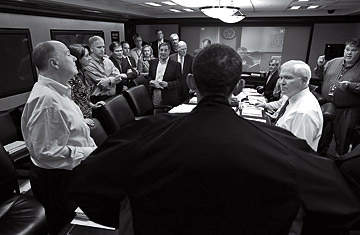
Mission Accomplished. Obama and his team after watching the strike unfold on a live feed from Pakistan.
"I can only speak with authority through Feb. 15, 2009," said Michael Hayden, who was George W. Bush's last CIA director. "But at that point, when people would ask 'When's the last time you really knew where he was?' my answer was Tora Bora in 2001."
Obama's first order to his new CIA Director Leon Panetta in 2009 was to "make the killing or capture of OBL the top priority of the war against al-Qaeda." That order grew out of a controversial Obama campaign pledge that "if we have Osama bin Laden in our sights and the Pakistani government is unable or unwilling to take him out, then we have to act and we will take him out. We will kill bin Laden; we will crush al-Qaeda. That has to be our biggest national-security priority."
While journalists have provided a number of histories of the events that led to bin Laden's death, the purpose of this analysis is to examine White House decisionmaking for lessons that can be applied to future foreign policy challenges. From the tens of thousands of pages of testimony reviewing failures that contributed to al-Qaeda's successful attack on the World Trade Center and the Pentagon, the most memorable one-liner came from counterterrorism czar Richard Clarke, who said, "Your government failed you." Summarized in a single line, the takeaway from the bin Laden operation is that American government worked.
Success in this case can be traced to three factors. Subtract any one from the picture and bin Laden would be actively plotting attacks on Americans today.
1. New capabilities created by intelligence and military agencies during the decade after 9/11 gave Obama choices and weapons that were not available to previous Presidents. Had these been available to Bill Clinton in 1998 after al-Qaeda's attacks on U.S. embassies in Africa or to Bush in 2001 when bin Laden was surrounded at Tora Bora, either would likely have ordered an operation that would have killed bin Laden. As Admiral William McRaven, who led the Joint Special Operations Command (JSOC) at the time of the raid, likes to say, "The bin Laden operation would simply not have been possible if CIA and JSOC had not spent a decade in bed together."
2. After a flawed process in the first year of Obama's presidency forced him to double down in Afghanistan, Obama put in place a disciplined national-security decisionmaking process — analytically rigorous at its core, insistent on written product and capable of adjusting to the requirements of each specific decision.
3. A Commander in Chief had the confidence and determination to slow the clock long enough to aim carefully before pulling the trigger. This required narrowing the circle of advisers to a handful of White House and sub-Cabinet officials to prevent a leak that would have been fatal to the mission. Until 24 hours before the U.S. acted, a majority of members of the National Security Council (NSC) were still unaware of the operation. Whether the rigorous control adopted in this process can be adapted to other foreign policy decisions remains an unanswered question.
